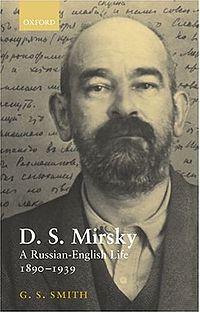- D. S. Mirsky
-
D.S. Mirsky is the English pen-name of Dmitry Petrovich Svyatopolk-Mirsky (Russian: Дми́трий Петро́вич Святопо́лк-Ми́рский), often known as Prince Mirsky (9 September [O.S. 22 August] 1890 – 6 June 1939), a Russian political and literary historian who promoted the knowledge and translations of Russian literature in Britain and of English literature in the Soviet Union.
Contents
Life
A scion of the Svyatopolk-Mirsky family, son of kniaz Pyotr Dmitrievich Sviatopolk-Mirskii, Imperial Russian Minister of Interior, he relinquished his princely title at an early age. During his school years, he became interested in the poetry of Russian Symbolism and started writing poems himself. He saw service in the Russian army during the World War I, joined the White movement as a member of Denikin's staff and eventually emigrated to Great Britain in 1921.
While teaching Russian literature in the University of London, Mirsky published his landmark study A History of Russian Literature: From Its Beginnings to 1900, which still remains a standard English-language guide to classical Russian literature. Vladimir Nabokov recommended it to his students as "the best history of Russian literature in any language, including Russian". This work was followed with the Contemporary Russian Literature, 1881–1925, which was somewhat marred by Mirsky's prejudiced view of Anton Chekhov and his inordinate liking for some of the Russian Formalists.
Mirsky was a founding member of the Eurasia Movement and the chief editor of the periodical Eurasia, his own views gradually evolving towards Marxism. He also is usually credited with coining the term National Bolshevism. In 1931, he joined the Communist Party of Great Britain and asked Maxim Gorky if he could procure his pardon by Soviet authorities. The permission to return to the USSR was granted him in 1932. On seeing him off to Russia, Virginia Woolf wrote in her diary that "soon they will put a bullet in his head". Five years later, during the Great Purge, Mirsky was arrested by the NKVD. Mirsky’s arrest may have been caused by a chance meeting with his friend, the British historian E. H. Carr who visiting the Soviet Union in 1937.[1] Carr stumbled into Prince Mirsky on the streets of Leningrad (modern Saint Petersburg, Russia), and despite Prince Mirsky's best efforts to pretend not to know him, Carr persuaded his old friend to have lunch with him.[2] Since this was at the height of the Yezhovshchina, and any Soviet citizen who had any unauthorized contact with a foreigner was likely to be regarded as a spy, the NKVD arrested Mirsky as a British spy.[3] He died in one of the gulag labor camps in 1939. Although his magnum opus was eventually published in Russia, Mirsky's reputation in his native country remains sparse.
Korney Chukovsky gives a lively portrait of Mirsky in his diary entry for 27 January 1935:
I liked him enormously: the vast erudition, the sincerity, the literary talent, the ludicrous beard and ludicrous bald spot, the suit which, though made in England, hung loosely on him, shabby and threadbare, the way he had of coming out with a sympathetic ee-ee-ee (like a guttural piglet squeal) after each sentence you uttered—it was all so amusing and endearing. Though he had very little money—he's a staunch democrat—he did inherit his well-born ancestors' gourmandise. His stomach will be the ruin of him. Every day he leaves his wretched excuse for a cap and overcoat with the concierge and goes into the luxurious restaurant [of the Hotel National in Moscow], spending no less than forty rubles on a meal (since he drinks as well as eats) plus four to tip the waiter and one to tip the concierge.[4]
Criticism
Malcolm Muggeridge, who met Mirsky after his return to USSR, apparently met one of the author's critics, a French correspondent to Russia named Luciani, who had this to say of Mirsky:
Mirsky had pulled off the unusual feat of managing to be a parasite under three regimes — as a prince under Czarism, as a professor under Capitalism, and as an homme-de-lettres under Communism.
Mirsky is familiar today partly because he is mentioned in George Orwell's work The Road to Wigan Pier, where Orwell is highly critical of "the Intelligentsia of Great Britain". However, Tariq Ali had a more favourable assessment in his Britain's Coming Revolution.
Works
- Anthology of Russian poetry (1924)
- Modern Russian Literature (1925)
- Pushkin (1926)
- A History of Russian Literature: From Its Beginnings to 1900 in two volumes (1926, 1927); repr. Knopf (1958), Northwestern University Press (1999)
- A History of Russia (1928)
- Lenin (1931)
- Russia: A Social History (1931)
- The Intelligentsia of Great Britain (1935), originally in Russian, translated by the author to English
- Anthology of Modern English Poetry (1937) in Russian, published during Mirsky's arrest without acknowledgment of his authorship
Notes
- ^ Jonathan Haslam, The Vices of Integrity, E.H. Carr, 1892–1982 (London; New York: Verso, 1999), p. 76.
- ^ Haslam, The Vices of Integrity, p. 76.
- ^ Haslam, The Vices of Integrity, p. 76.
- ^ Kornei Chukovsky, Diary, 1901-1969 (Yale University Press, 2005: ISBN 0300106114), p. 313.
Further reading
- Gerald Stanton Smith. D. S. Mirsky : A Russian-English Life, 1890–1939. Oxford University Press: 2000 (ISBN 0-19-816006-2).
- (French) Nina Lavroukine et Leonid Tchertkov, D. S. Mirsky : profil critique et bibliographique, Paris, Intitut d'Études Slaves, 1980, 110 pages, 6 planches hors-texte (ISBN 2-7204-0164-1).
External links
Categories:- National Bolshevism
- Russian poets
- Russian philologists
- Russian journalists
- Russian historians
- Russian nobility
- 1890 births
- 1939 deaths
Wikimedia Foundation. 2010.

